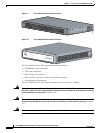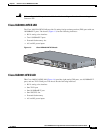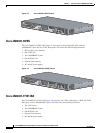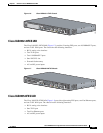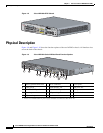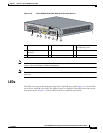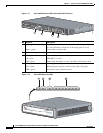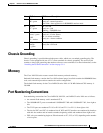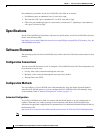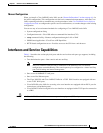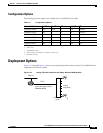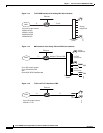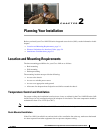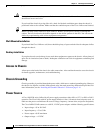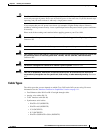
1-10
Cisco IAD2430 Series Integrated Access Devices Hardware Installation Guide
OL-4234-06
Chapter 1 Overview of Cisco IAD2430 Series IADs
Specifications
Port numbering conventions for the Cisco IAD2435 series IAD are as follows:
• Fast Ethernet ports are numbered 0 and 1, from left to right.
• The controller T1/E1 port is numbered T1 0 or E1 0, from left to right.
• FXS voice port numbering begins at 0 and reaches a maximum of 7, depending on the number of
voice ports, from left to right.
Specifications
For the Cisco IAD2430 series hardware and electrical speicfications, see the Cisco IAD2430 series data
sheets at the following URL:
http://www.cisco.com/en/US/prod/collateral/voicesw/ps6790/gatecont/ps887/ps5321/product_data_she
et09186a008019aded.html
Software Elements
The operating system for the Cisco IAD2430 series IADs is the Cisco IOS software that resides in flash
memory.
Configuration Connections
You can use an ASCII terminal or a PC to configure a Cisco IAD2430 series IAD. The configuration can
be performed in several ways:
• Locally, with a direct connection through the serial port
• Remotely, with a connection through the serial port and a modem
• Through Telnet and TFTP
Configuration Methods
You can configure a Cisco IAD2430 series IAD automatically using the Simple Network-Enabled
Auto-Provision (SNAP) option, or you can configure theCisco IAD2430 series IAD manually using
several methods listed in
“Manual Configuration” section on page 1-11.
Automated Configuration
If your Cisco IAD2430 series IAD was ordered with the SNAP option, no on-site configuration is
required. When the Cisco IAD is powered on and connected to the WAN, the SNAP application
downloads the applicable configuration files automatically. For additional information about SNAP, see
the following URL:
http://www.cisco.com/univercd/cc/td/doc/product/software/ios122/122newft/122t/122t8/ftapiad8.htm
Note The SNAP option is not available on the Cisco IAD2435 IAD.



